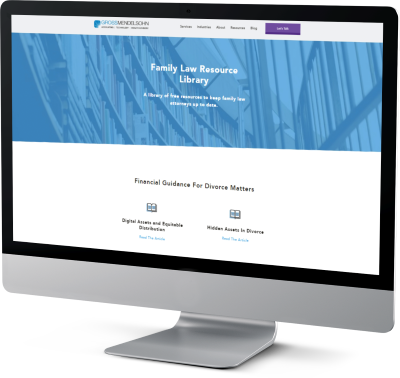Divorce cases where one party owns a closely-held business can create complications in the valuation and division of the marital estate. One of the many questions commonly encountered in Virginia divorce cases involving a closely-held business is, How is an increase in a marital business’s value from the date of separation to trial treated?
Frequently, the time between date of separation and trial is more than a year, and sometimes it’s several years. It’s possible that during this time many factors, from changes in business operations to industry changes, could cause the value of the business to increase.
Let’s consider how this increase in business value may be treated in Virginia divorce cases.
Although not explicit, Virginia code offers some insight on how Virginia courts may treat this situation.
Per the VA code §20-107.3 (A)(1):
[…] The increase in value of separate property during the marriage is separate property, unless marital property or the personal efforts of either party have contributed to such increases and then only to the extent of the increases in value attributable to such contributions. The personal efforts of either party must be significant and result in substantial appreciation […].
While this section discusses the change in character of separate assets during the marriage, some may interpret the inverse of this provision to apply for marital assets. So, for a business that was founded during the marriage and increases in value post-separation, the courts might consider post-separation increase in value to be marital unless there is evidence that significant, personal effort caused the increase in value post-separation.
Not surprisingly, there are many misconceptions about this code section. The sections below describe the most common misconceptions we have encountered.
The Meaning of “Personal, Substantial Effort”
In our experience, many parties have underestimated the threshold that constitutes “substantial effort” as described in the Code. Examples that might constitute substantial effort include organizing and opening a new business location or offering an entirely new business service line post-separation.
The effort must be “personal.” A post-separation increase in business value due to the efforts of other individuals or wider geographic or market factors does not help the argument that the effort was personal.
For example, many companies manufacturing or distributing personal protective equipment (“PPE”) generally experienced increased demand and growth of revenues sourced to the COVID-19 virus outbreak. If this led to increased business value, related owners that separated from their spouses in or around this time would have to overcome the argument that the overall increase in value was not related to circumstances outside of their control and effort (the pandemic).
An example can be found in the case Ledwith v. Ledwith (Va. Ct. App. 2004), where the wife owned an orthodontic medical practice and argued that the increase in the business’s value post-separation was separate. However, the Court determined that no evidence was presented to support that the increase was due to the extraordinary efforts of the wife or that her patient base increased. Further, the Court noted that any increase could be due to factors outside the wife’s control:
“Even if a post-separation increase in patient base had been established, such an increase would not necessarily be attributable to wife’s personal efforts post-separation. Any increase could just as easily have been attributable to her pre-separation efforts to establish her professional reputation in the community or could have resulted from post-separation factors not directly within her control, such as an increase in population in the four-county area in which she was the only orthodontist.”1
The Continuation of Growth In a Marital Business Is Not Separate
Many companies experience organic year-to-year growth. Another common misconception is assuming that organic growth post-separation is separate. If the growth is largely a continuation of growth from prior marital efforts, then this may benefit the argument of marital increase in value post-separation.
For example, in the Virginia case, Washington v. Washington, the Court threw out the husband’s separate claim to the business’s increase in value post-separation as “no evidence established that this increase occurred due to any extraordinary efforts on the husband’s part, beyond the effort he was already expending before the separation to develop the business.”2
In addition, a business acquiring new clients or contracts post-separation may not necessarily be indicative of separate growth. New contracts with existing clients may suggest a continuation of the marital business. Some businesses are transactional in nature and as a result have short-term or one-time clients. However, the referral source of transactional work may be based upon relationships established during the marriage, which may be an indicator that business operations did not change post-separation.
The Spouse Arguing for Post-Separation Increase as Separate Has the Burden of Proof
Lastly, based on our review of these cases, it appears that the spouse making a separate claim to post-separation increase in business value bears the burden to prove that the post-separation increase was due to their personal and substantial efforts. In order to satisfy this burden, the arguing party has to provide evidence to support their claim.
Need Help?
Contact us here or call 800.899.4623.
[1] Ledwith v. Ledwith, 2004 WL 3391801 (Va. Ct. App. 2004).
[2] Washington v. Washington, 2005 WL 1017659 (Va. Ct. App. 2005).


